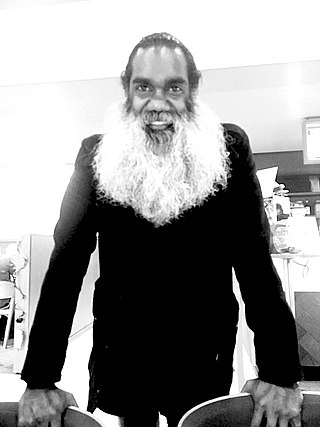Related Research Articles

The Noongar are Aboriginal Australian peoples who live in the south-west corner of Western Australia, from Geraldton on the west coast to Esperance on the south coast. There are 14 different groups in the Noongar cultural bloc: Amangu, Ballardong, Yued, Kaneang, Koreng, Mineng, Njakinjaki, Njunga, Pibelmen, Pindjarup, Wadandi, Whadjuk, Wiilman and Wudjari. The Noongar people refer to their land as Noongar boodja.
Sally Jane Morgan is an Australian Aboriginal author, dramatist, and artist. Her works are on display in numerous private and public collections in Australia and around the world.

Bangarra Dance Theatre is an Aboriginal and Torres Strait Islander dance company focused on contemporary dance. It was founded by African American dancer and choreographer Carole Y. Johnson, Gumbaynggirr man Rob Bryant, and South African-born Cheryl Stone. Stephen Page was artistic director from 1991 to 2021, with Frances Rings taking over in 2022.

Larissa Yasmin Behrendt is an Australian legal academic, writer, filmmaker and Indigenous rights advocate. As of 2022 she is a professor of law and director of research and academic programs at the Jumbunna Institute for Indigenous Education and Research at the University of Technology Sydney, and holds the inaugural Chair in Indigenous Research at UTS.
Wesley James Enoch is an Australian playwright and artistic director. He is especially known for The 7 Stages of Grieving, co-written with Deborah Mailman. He was artistic director of the Queensland Theatre Company from mid-2010 until October 2015, and completed a five-year stint as director of the Sydney Festival in February 2021.
Ceremonial dancing has a very important place in the Indigenous cultures of Australia. They vary from place to place, but most ceremonies combine dance, song, rituals and often elaborate body decorations and costumes. The different body paintings indicate the type of ceremony being performed. They play an important role in marriage ceremonies, in the education of Indigenous children, as well as storytelling and oral history. The term corroboree is commonly used to refer to Australian Aboriginal dances, although this term has its origins among the people of the Sydney region. In some places, Aboriginal people perform corroborees for tourists. In the latter part of the 20th century the influence of Indigenous Australian dance traditions has been seen with the development of concert dance, with the Aboriginal Centre for the Performing Arts (ACPA) providing training in contemporary dance.
The NAISDA Dance College is a performing arts training college based in Kariong, New South Wales for Aboriginal and Torres Strait Islander people in Australia. It was established as the Aboriginal Islander Skills Development Scheme (AISDS) in 1975, which became the National Aboriginal and Islander Skills Development Association (NAISDA) in 1988. The date of establishment of the college is usually cited as 1976, although some sources report it as 1975.

The Yirra Yaakin Theatre Company, also known as Yirra Yaakin Noongar Theatre, is an Aboriginal Australian theatre company, based in Perth, Western Australia in the heart of the Noongar Nation, a cultural group from the South West of Western Australia.
Luke Carroll is an Australian stage, television and film actor.
Brian Gregory Syron was an actor, teacher, Aboriginal rights activist, stage director and Australia's first Indigenous feature film director, who has also been recognised as the first First Nations feature film director. After studying in New York City under Stella Adler, he returned to Australia and was a co-founder of the Australian National Playwrights Conference, the Eora Centre, the National Black Playwrights Conference, and the Aboriginal National Theatre Trust. He worked on several television productions and was appointed head of the ABC's new Aboriginal unit in 1988.

Anita Marianne Heiss is an Aboriginal Australian author, poet, cultural activist and social commentator. She is an advocate for Indigenous Australian literature and literacy, through her writing for adults and children and her membership of boards and committees.
Kylie Bracknell, formerly Kylie Farmer and also known as Kaarljilba Kaardn, is an Aboriginal Australian writer, director and actress.
Kelton Pell is an Aboriginal Australian (Noongar) stage, TV and film actor, best known for his role as the court liaison officer, Sam Wallan, in the SBS legal drama The Circuit set in north-western Australia. Pell is from Western Australia.
Dallas Winmar is a Western Australian writer who first worked with Company B in 2001 on the staging of her play Aliwa!. This play was first showcased in Perth by Yirra Yaakin Noongar Theatre and developed at the Australian National Playwrights Conference in 1999 and 2000.
The Red Ochre Award is an annual art award for Indigenous Australian artists.

Miranda Tapsell is a Larrakia Aboriginal Australian actress of both stage and screen, best known for her role as Cynthia in the Wayne Blair film The Sapphires and her 2015 performance as Martha Tennant in the Nine Network drama series Love Child. In 2016, she portrayed Fatima in the Stan series Wolf Creek.

Karla Hart is a writer, film-maker, dancer, actress and director and has been the event co-ordinator for Wardarnji Festival 2011- 2015, is currently the Drive time presenter for Noongar Radio which broadcasts in Perth, Western Australia.

Trevor Jamieson is an Aboriginal Australian stage and film actor, playwright, dancer, singer and didgeridoo player.
Della Rae Morrison is an Aboriginal actress, songwriter and activist of the Bibulman Noongar people.
Lynette Wendy Russell, is an Australian historian, known for her work on the history of Indigenous Australians; in particular, anthropological history ; archaeology; gender and race, Indigenous oral history, and museum studies.
References
- 1 2 3 4 "Lynette Narkle". Jiriki Management. Archived from the original on 29 March 2017. Retrieved 2 September 2021.
- 1 2 3 "Lynette Narkle". Australia Council for the Arts. 2017. Retrieved 2 September 2021.
- 1 2 3 Ace, Emily (13 March 2018). "Meet Lynette Narkle, and join in her journey". South Western Times . Retrieved 2 September 2021.
- ↑ "State of Shock". Frontline Films. 2018. Retrieved 14 September 2021.